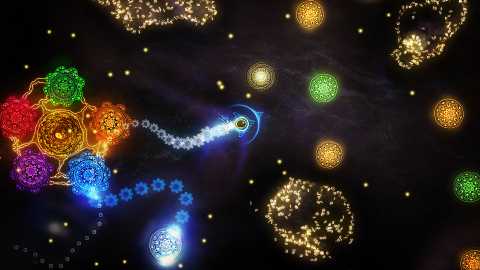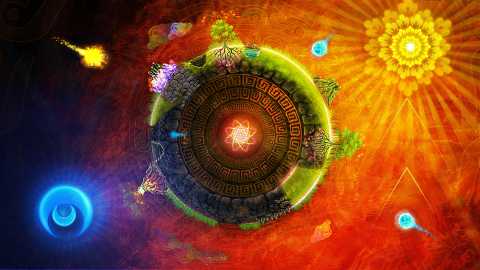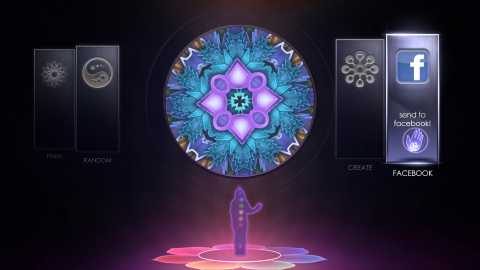When one looks at THQ's current lineup of more casually-oriented games, you can identify a distinct audience for pretty much all of them. For the younger, more creative crowd, there's U-Draw, the tablet-based peripheral released last year on the Wii, and now coming to the Xbox 360 and PlayStation 3. For the fitness crowd, there's MiCoach, an exercise game featuring real athletes and their training programs. For young girls, plus the odd middle-aged confirmed bachelor, there's Barbie Jet, Set and Style.

That said, one title in THQ's lineup of casual games left me scratching my head. It's a title that that, in theory, certainly would seem to have an audience, but the question of whether that audience would actually own and/or use a gaming console is, at this point in time, a relatively untested theory. THQ seems to believe there is an audience for it, otherwise they wouldn't be producing the game. And yet, as I went through the motions of this peculiar game and asked about its various mechanics and concepts, I got the distinct sense that this whole thing might just be one big shot in the dark.
I am speaking about Deepak Chopra's Leela. Announced at E3 as "The Deepak Chopra Project" via this slightly mystifying trailer, this is not, sadly, a Deepak Chopra-oriented progressive rock band following in the footsteps of noted self-help guru Alan Parsons, but rather a "notgame" for Microsoft's Kinect. I say notgame because THQ was adamant in explaining to me that This Is Not A Game. Except, in a way, it kind of is. But not really.
Look, I'm trying here, people.
When I saw Leela at a recent THQ press event, the game...er, product was cordoned off in a back area decked out with trippy artwork (much of which was taken directly from Leela), candles, decorative draperies, and a spacey, smiling woman in a tie-dye skirt. The whole thing was clearly meant to evoke the sort of relaxing mood associated with the meditative arts, but to be honest, I felt a step away from someone in the room asking me what kind of scented oils I wanted with my Reiki massage.
Unsettled as I initially was, things became a tad less discomfiting once the woman positioned me in front of the Kinect sensor and Curious Pictures producer Lewis Kofsky began explaining both the premise of Leela and how the whole thing works.
Leela, in Sanskrit, means "play." That might sound odd for a game that supposedly isn't a game, but throughout Leela's various sections, you do find yourself ostensibly playing with the mechanics it puts in front of you. There is no score keeping, nor any real "win" condition, so to speak. But you are doing things to create a desired result, and at least theoretically, the things you're doing are supposed to be kind of fun. Above all else, though, they're meant to help focus your seven chakras.
I'm guessing if I'm going to lose anyone in this article, it's going to be right about here. My dad is into meditation, and my mom has a fascination with new age spirituality, so the term "chakra" is not new to me. That said, my understanding of how any of this stuff works is essentially nonexistent. Rather than force any lengthy explanations on you, I'll simply tell you to do what I did if you're really interested in learning more, and just go to Wikipedia. For the lazier man among you, chakras are essentially energy whorls that exist within everyone, according to tantric and yogic Hindu and Buddhist beliefs. There are seven of them, starting at the crown of the skull, and going all the way down to the base of the spine.

How does any of this translate into something you can use your Kinect with? In effect, Leela breaks out each chakra into its own unique minigame. These minigames are specifically designed to try and help the player focus each individual chakra through movement. In one example, the "root chakra" (the one at the base of the spine) is focused through hip movements. You're shown a desolate planet on the screen, with only a few cracks in the earth. By moving your hips from side to side, the cores of the planet rotate, allowing you to move the cracks into rain clouds and the sun, helping trees grow and flourish, and eventually creating a happy green planet.
Moving up a couple to the "navel chakra," I was presented with a rock wall that, bit by bit, sinks toward a fiery pit. Using your arms, you launch energy balls to blast through the rock, releasing energy gems you're meant to collect before they fall into the lava.
Lastly, I tried the "third-eye chakra" game. This is, of course, the chakra in the center of the forehead, just above the eyes, that is meant to guide you, and even leads to clairvoyance, if some are to be believed. In this game, you use your upper body (and primarily your head) to rotate a cylindrical path that looks straight out of Child of Eden, or some ancient Harmonix game. The path is tinged with various colored sections that move in patterns. The idea is to get your movements timed correctly to the pace of the level's progression, so you are effectively rotating the screen and hitting only the same-colored sections. Hitting a different color resets the progression.
For a game that purportedly isn't a game, Leela is fairly gamey. Again, with no real scoring system to speak of, progress is only (presumably) measured by how relaxed and in tune with your chakras you are. But there is a progression to each game, with higher difficulties to try as you get the hang of each section. There are achievements, of course, but competing for points would generally seem to defeat the purpose here.
Apart from the obvious branding, Chopra's involvement is slightly opaque. The game features a number of text-based affirmations along the lines of, "Only you own your feelings and ability to be happy," which are certainly Chopra-ian in nature. When I asked Kofsky about how the game came about, he simply explained that his partner works on Chopra's Sirus radio show, and that a desire to create a game around Chopra's teachings had been something they'd wanted to do for some time. He did not elaborate on Chopra's role in the game's development beyond that, though if you are to believe the initial trailer for the game, this is very much "his" game.
To understate it massively, Leela is kind of a strange concept. I suppose on one hand, it's a compliment to what gaming has become that something as out-of-left-field as Leela can exist, since it helps broaden the spectrum of what we believe we can do with gaming technology. And yet I am still left with the same nagging feeling I had going into my Leela demo, the feeling that the audience in tune with Chopra's teachings is not necessarily an audience that crosses over heavily with that of the Kinect. With 10 million Kinect units shipped to stores, I suppose somewhere in there must be an audience looking to use their new-fangled Xbox camera device to find some peace of mind, body, and soul. There is also a Wii version in development that uses the Wii remote's motion sensing (though that version was not on display), so that's probably an even bigger audience.

Ultimately, all you can judge a game like Leela on is how well it does what it sets out to do. I guess my problem in trying Leela is that I don't have a clue how to even perceive if what it's trying to do is working. Was my mind at greater peace after playing Leela? Not especially, though that probably had something to do with the PR rep, producer, and spacey hippy lady all staring at me intently while I tried to discover inner peace through hip movements, or what have you. Were my chakras more focused after playing Leela? I don't think I've ever been especially in tune with my chakras, so I'll just smile, nod, and say "Yeah, totally!" and steer the conversation in a new direction so that you don't have time to ask a follow-up question.
And then there is, of course, the million dollar question: Is Leela a game? I have no idea. Maybe it isn't a game, but it's something. It's definitely something.